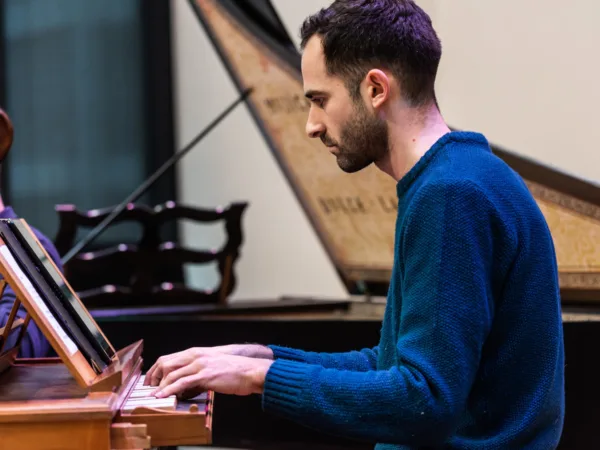In March, master students would present their research projects to an international committee during the Master Research Symposium. Due to the corona measures, the symposium took place online. Tim Braithwaite is one of the students completing their Master’s studies this year. He is a singer and a teacher at the Royal Conservatoire and is completing his Master’s in Early Music Theory.
‘I completed my Bachelor’s at Royal Holloway, University of London in ‘Music’ which was a broad course of study involving musicological, theoretical, and practical elements. Perhaps the most influential educational experience of my career thus far however, has been my year spent as a ‘choral scholar’ with Truro Cathedral Choir, in which I sang with the professional Cathedral Choir, performing seven services per week.’
Tim came to the Royal Conservatoire The Hague for his Master’s, of which research is an important part.
Anonymous Scottish manuscript
‘I was extremely fortunate with my research supervisor Niels Berentsen, indeed as one of the leadings specialists in the field, he was one of the reasons I initially chose to study in The Hague. His support and confidence throughout the process has been and continues to be invaluable. The focus of my research over these past two years has been the contents of an anonymous Scottish manuscript dated to about 1580, specifically those chapters which relate to the practice of improvising ‘super librum’. Alongside a commentary and contextualisation of the source, I provided a partial translation from historical Scots to modern English, as well as transcriptions of the copious musical examples found therein.’
Because of the necessary corona measures, all the Master Research presentations were given online. About his presentation, Tim explains: ‘I recorded my presentation as I spoke through my slides. Obviously the practical elements of my presentation were impossible to do in this situation, I had hoped to demonstrate some of the more polyphonic examples found in the source but unfortunately getting my ensemble together was impossible.’
Relationship with past musical cultures
We asked Tim why is doing research is important for musicians. ‘This is a very interesting question, and it’s difficult to speak on behalf of other musicians who may prioritise rather different things than I. I think that musicians of all sorts are defined, at least in part, by their relationship with past musical cultures, especially those of us who perform past repertoires on a regular basis. For me, research has been the freedom to escape orthodoxies and to question what I had perceived to be universals in my musical value system. One aspect of this which I find to be particularly fascinating is the relationship a musician has with musical notation, especially when a performance practice begins to veer into what we might describe as ‘improvisation’.’
Pursuing the research
‘I would like to stress my gratitude to those members of staff who have been supportive throughout the course of my Master’s. Niels Berentsen in particular has been tireless in his help and encouragement, and I am excited to be working with him in the future pursuing my research through the Haute École de Musique de Genève over the next few years where he now teaches.’








